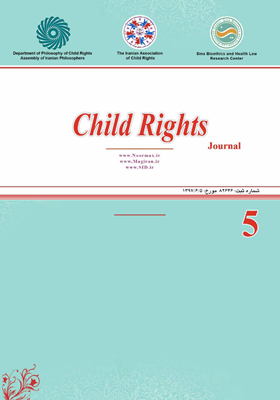Educating Children & Juveniles Deprived of Their Liberty & the Challenges They Face in Iran Law
Subject Areas : child rights
Jamal Beigi
1
,
Mehrdad Teymoori
2
![]()
1 - Associate Professor, Department of Criminal Law & Criminology, Maragheh Branch, Islamic Azad University, Maragheh, Iran
2 - .D. Student in Criminal Law & Criminology, Islamic Azad University, Maragheh Branch, Maragheh, Iran
Keywords: Child, Juvenile, Education, Iran's Rules, Correctional Center,
Abstract :
Background and aim: Every child & juvenile, in every place & time, is equally entitled to the enjoyment of his or her human rights as an inherent & inalienable right. Whether that child & juvenile is a criminal or a non-criminal, children & juveniles deprived of their liberty are among the most vulnerable groups in society whose rights cannot be ignored. Today education is considered an essential element of the progress & development of human societies & the right to education of children & juveniles deprived of their liberty is also considered as one of their human rights & citizenship. Although, having the right to education of children & juveniles deprived of their liberty can play an essential role in re-socializing & reforming them. However, the implementation of this right in Iran has several challenges. Methods: The present paper, which is written using library documents & resources in a descriptive & analytical manner, examines the challenges facing the right to education of children & juveniles deprived of their liberty in Iran & offers solutions. Results: Findings & results of the study indicate that the implementation of the right to education of children & juveniles deprived of liberty in Iran faces numerous cultural, financial, judicial, legal, administrative & security challenges that must be addressed in order to address the existing challenges using the solutions provided for each What better way to take action than to enforce this right. Conclusion: The facts show the need for societies to have places that can keep inconsistent & abnormal people out of society for a while & to make arrangements so that they can reform & return to society for social welfare. The right to education of children & juveniles deprived of their liberty is one of their fundamental rights & it is the responsibility of governments to take measures in this regard to take. So that they, like other members of society, can achieve the right to education as their human right.
1. Feizi Khezerlou H. A Comparative Study of the Right to Free Education in International Documents and Iranian Law. Maragheh: Dissertation for Master's Degree in International Law, Islamic Azad University, Maragheh Branch; 2015. p.9.
2. Available at: http://www.sayeh-news.com.
3. Hojaji Najaf Abadi M. Massimo papa, Childrens Rights to Education in International Human Rights Documents. Child Rights Quarterly 2019; 1(3): 213-237.
4. Beigi J. Legal Strategy for Children and Adolescents in Educational Policy Making. Science and Technology Policy Quarterly 2019; 6(4): 31-46.
5. Beigi J, Teymouri M. The Right to Education of Children Deprived of Freedom and the Challenges Facing It in Iran. Tehran: International Conference on the Rights of the Child; 2020.
6. Foucault M. Care and Punishment of Prison Birth, translation: Nico sarkhosh and Afshin jahandide. Tehran: Publishers Ney; 2006. p.155-288.
7. Available at: http://www.poolnews.ir.
8. Niavani S. The Right to Education in the International Human Rights System. Journal of Legal Research 2010; 4(52): 381-433.
9. Ashoori M. Replace prison or intermediate punishment. Tehran: Publishers Gerayesh; 2003. p.44.
10. Waeli A. Prison Sentences in Islam. Translated by Bekaii MH. Tehran: Publishers Islamic Culture; 1983. p.220.
11. Danesh T. Prisoners' rights and prison science. Tehran: Publishers University of Tehran; 1997. p.3-231.
12. Rajabi A. Description of the Code of Prisons and Security Measures of Iran. Tehran: Publishers Daneshvar; 2003. p.117-118.
13. Najafi Abrandabadi H. Iran's Criminal Policy in the Territory of Prisons: The Continuous Evolution of Executive Regulations, introduction: Bullock Bernard. Tehran: Publishers Majd; 2006. p.9.
14. Available at: http://www.afkarnews.com.
15. Najafi Abrandabadi H. Protecting the right to education in the field of criminal policy. Journal Educational Excellence in the Jurisprudence of Khuzestan Province 2009; 4(35): 49-51.
16. Ansari B. The right to education: The right of the child to education in the international human rights system. 1st ed. Tehran: Publishers Shahr danesh; 2014. p.142.
17. Jahangiri A, Qomashi S. Investigating the Reproductive Functions of Enforcing the Right to Education in Isfahan Prisons. Journal of Criminal Law 2017; 8(2): 63-91.
18. Abdi A. Social Pathology Impact of Prison on Prisoner. Tehran: Publishers Noor; 1992. p.75-76.


